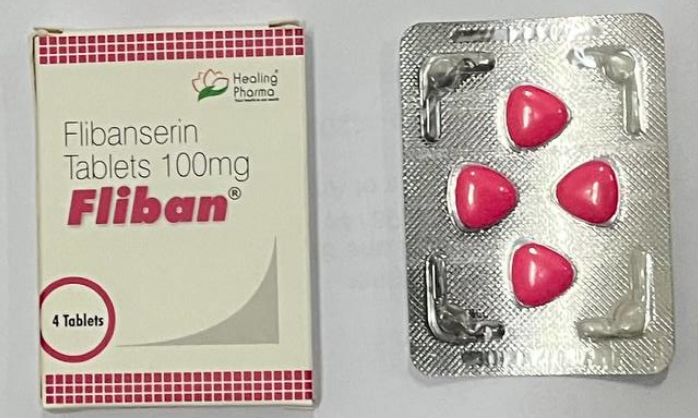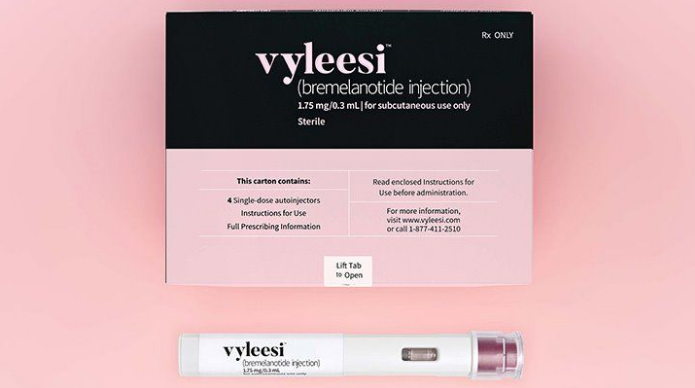Addyi and Vyleesi are two medications approved by the U.S. Food and Drug Administration (FDA) for the treatment of sexual dysfunction in women. However, they have different mechanisms of action and are used to address different aspects of sexual dysfunction.
Addyi
Addyi, also known by its generic name flibanserin, is a medication approved by the U.S. Food and Drug Administration (FDA) for the treatment of hypoactive sexual desire disorder (HSDD) in premenopausal women. HSDD is characterized by a persistent and distressing lack of sexual desire.
Addyi works on the central nervous system to increase sexual desire. It is a serotonin 1A receptor agonist and a serotonin 2A receptor antagonist. This complex mechanism affects serotonin levels in the brain, helping to restore a healthy balance of neurotransmitters associated with sexual desire.
Addyi was developed by the pharmaceutical company Sprout Pharmaceuticals. It received FDA approval in August 2015, making it the first drug approved to specifically treat HSDD in women. The approval came after years of debate and controversy, as previous attempts to gain approval had been unsuccessful due to concerns about its safety and effectiveness.
Addyi is intended for premenopausal women who experience a persistent lack of sexual desire. It is not a medication meant to enhance sexual performance or address other sexual dysfunctions. It is available in the form of oral tablets.

The starting dose of Addyi is 100 milligrams once daily at bedtime. However, healthcare providers may adjust the dosage based on individual response and side effects. It is important not to exceed the recommended dose.
Women taking Addyi may not experience an immediate increase in sexual desire. It can take several weeks for the full effects to become noticeable. Treatment duration can vary, and it should be discussed with a healthcare provider.
Addyi can have side effects, some of which can be serious. Common side effects include dizziness, drowsiness, nausea, and dry mouth. More serious side effects include low blood pressure and fainting, especially when taken with alcohol. Because of these potential side effects, it is recommended that women avoid alcohol while taking Addyi.
Addyi is not suitable for everyone. It should not be used by women who have a history of low blood pressure, liver problems, or who are taking medications that interact with it. Also pregnant women are not advised to take the medication.
Addyi has been a subject of ongoing research and debate. Some critics argue that its efficacy may not be as strong as initially hoped, and there have been concerns about its safety profile. It’s essential for individuals considering Addyi to have a candid discussion with their healthcare provider about the potential benefits and risks.
Also Read: Difference Between Male And Female Viagra
Vyleesi
Vyleesi, also known by its generic name bremelanotide, is a medication approved by FDA for the treatment of hypoactive sexual desire disorder (HSDD) in premenopausal women. Like Addyi (flibanserin), Vyleesi is intended to address a persistent and distressing lack of sexual desire.
Vyleesi works differently from Addyi. It is a synthetic peptide that mimics the effects of alpha-melanocyte-stimulating hormone (alpha-MSH) in the body. Alpha-MSH plays a role in regulating sexual desire and arousal by acting on receptors in the brain.

Vyleesi received FDA approval in June 2019. It is the second medication approved for the treatment of HSDD in women, following Addyi. The approval of Vyleesi provided another option for women who did not respond well to or could not tolerate Addyi. Vyleesi is available as an injectable self-administered subcutaneous injection.
Vyleesi is indicated for premenopausal women who experience a persistent lack of sexual desire. It is not meant to enhance sexual performance or treat other sexual dysfunctions due to medical problems, psychiatric problems, or problems within the relationship.
The medication is administered as needed, at least 45 minutes before anticipated sexual activity. The initial recommended dose is 1.75 mg, but some patients may need to adjust the dose based on individual response and tolerability. It is important not to exceed more than one dose per day or more than eight doses per month.
Vyleesi is used on an as-needed basis, which means it is taken only when sexual activity is anticipated. The medication is not intended for daily use. Women should discuss the frequency and timing of use with their healthcare provider.
Common side effects of Vyleesi include nausea, flushing, and headache. These side effects are usually mild to moderate in severity and tend to diminish over time with continued use. However, some individuals may experience more severe side effects, and it’s important to discuss any adverse reactions with a healthcare provider.
Vyleesi is contraindicated in women with uncontrolled hypertension (high blood pressure), cardiovascular disease, and certain other medical conditions. It should not be used with alcohol due to the potential for increased side effects.
Vyleesi continues to be the subject of research to better understand its long-term safety and efficacy. It is relatively new on the market, and healthcare providers and patients should stay informed about any updates or new findings related to the medication.
Addyi vs Vyleesi: Key Differences
| Feature | Addyi (Flibanserin) | Vyleesi (Bremelanotide) |
|---|---|---|
| Active Ingredient | Flibanserin | Bremelanotide |
| Approved Use | Hypoactive Sexual Desire Disorder (HSDD) in premenopausal women. | Generalized Hypoactive Sexual Desire Disorder (HSDD) in premenopausal women. |
| Mechanism of Action | Acts on neurotransmitters in the brain, increasing sexual desire. | Acts on melanocortin receptors in the brain, enhancing sexual arousal. |
| Dosage Form | Oral tablet | Subcutaneous (under the skin) injection. |
| Administration | Taken daily at bedtime, regardless of sexual activity. | Self-administered as needed at least 45 minutes before anticipated sexual activity. |
| Timing of Use | Continuous daily use for overall improvement in sexual desire. | As-needed use for specific sexual events. |
| Onset of Action | May take several weeks to see noticeable effects on sexual desire. | Works within 45 minutes of administration to enhance sexual arousal. |
| Common Side Effects | Dizziness, nausea, fatigue, sleepiness, low blood pressure, fainting. | Nausea, flushing, headache, injection site reactions. |
| Alcohol Interaction | Strongly discouraged due to the risk of severe hypotension (low blood pressure) and fainting. | Alcohol should be avoided when using Vyleesi, as it may increase the risk of nausea. |
| Hormonal Influence | Does not significantly affect hormonal levels. | Does not significantly affect hormonal levels. |
| Special Considerations | Should not be used with alcohol, strong CYP3A4 inhibitors, or in women with liver impairment. | Not recommended for use in women with uncontrolled hypertension or cardiovascular disease. |